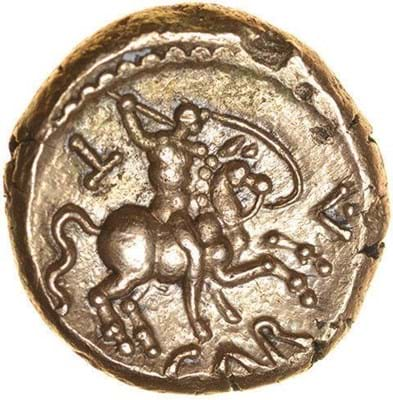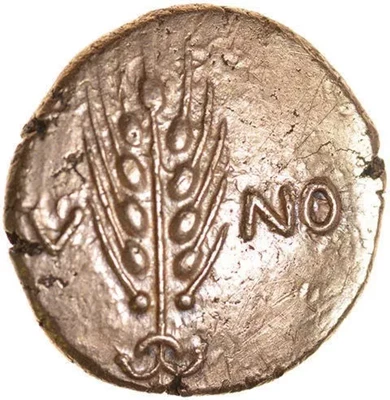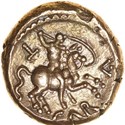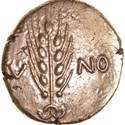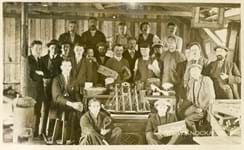Dr John Sills, author of Divided Kingdoms: the Iron Age Gold Coinage of Southern England, dubbed it ‘the most important single Iron Age coin ever found in this country”.
And on November 15, the first known gold coin of Caratacus – unearthed by a metal detectorist last November in a Berkshire field – sold at auction for a record £71,000 (plus 20% buyer’s premium).
Caratacus, king of the Catuvellauni tribe, is one of the few figures that have come down to us from the pre-Roman era. He is remembered as the freedom fighter who defied and delayed the forces of invasion for eight years until he was betrayed in Yorkshire by Cartimandua, queen of the Brigantes. An eloquent speech he gave as a captive in Rome famously led to his pardon.
The Caratacus Warrior stater, so-called as it includes the image of a naked figure on horseback holding a javelin and a shield, with the word Carat, was struck at Calleva (modern Silchester in Hampshire) shortly before the Roman invasion of 43AD. The discovery of this hitherto unknown Celtic coin in a field near Newbury (only 20 miles away but two millennia later) caused considerable comment among numismatists and historians.
It sheds light on the resources Caratacus could command (previously his coinage was known only in silver) but also points to the man himself. The inscription Cvno alongside an ear of barley conf irms Caratacus was a son of Cunobelinus, the legendary Old King Cole and Cymbeline of Shakespeare fame.
The inscriptions verso add to the speculation that Caratacus had been educated in Rome and probably conversed in Latin as he remonstrated in chains before Claudius.
It is visually close to the coins issued by Epaticcus, a brother of Cunobelinus who died c.35AD, and also confirms the attribution to Caratacus of a group of similar silver coins bearing the inscriptions Car and Cara.
Important pedigree
Norwich numismatic auctioneer Chris Rudd believed that a coin with this pedigree could command in excess of £30,000 – more than the previous record for a British Iron Age coin.
That stood at £21,000* for a gold stater that provided the first evidence for a hitherto unknown king called Anarevitos, active in Kent in the decades immediately before the Roman conquest. Found on farmland near Dover in 2010, it is now in the British Museum.
An institutional purchase of the Caratacus gold stater was also mooted. However, included in a 34-lot timed online sale on thesaleroom.com, the bidding contest was won by a UK private collector.
* Similar gold staters were issued by Vercingetorix (c.82-46BC), the king of the Arverni who united the Gauls during the last phase of Julius Caesar’s Gallic Wars. A coin of this type brought SFr225,000 (about £150,000) at Maison Palombo in Geneva in 2014.


